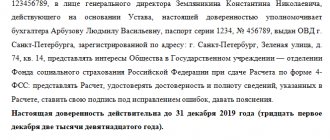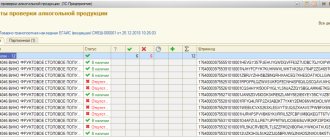We have developed an accounting policy. Do we understand correctly that all primary forms we use need to be approved in its composition: both those developed independently and those used according to unified forms?
Forms of primary accounting documents developed independently must be provided as appendices to the accounting policies of paragraph 4 of PBU 1/2008. Should go there:
- document forms developed by you that are not contained in albums of unified forms;
- unified forms that your organization has supplemented with its details.
If you use document forms approved by Rosstat (Goskomstat) without making any changes to them, then there is no need to make them annex to the accounting policy. In this case, it is enough to indicate that you prepare the primary accounting documents according to unified forms. This can be done by adding, for example, the following phrase:
“To document the facts of economic life, the organization uses unified forms of primary accounting documentation approved by:
- Resolution of the State Statistics Committee of Russia dated January 21, 2003 No. 7 “On approval of unified forms of primary accounting documentation for accounting of fixed assets”;
- Resolution of the State Statistics Committee of Russia dated October 30, 1997 No. 71a “On approval of unified forms of primary accounting documentation for accounting for labor and its payment, fixed assets and intangible assets, materials, low-value and wearable items, work in capital construction”;
- Resolution of the State Statistics Committee of Russia dated December 25, 1998 No. 132 “On approval of unified forms of primary accounting documentation for accounting of trade operations,” etc.”
For the first time, the accounting policy and appendices to it are approved by order of the head within 90 days from the date of entering information about the creation of the organization in the Unified State Register of Legal Entities. Then there is no need to approve a new accounting policy every year or issue an order to extend the validity of the old one. If necessary, the accounting policy can be changed or supplemented with Art. 313 Tax Code of the Russian Federation; pp. 4, 8, 9, 10 PBU 1/2008.
Accounting policies and accounting policies for tax purposes can be drawn up: in the form of two separate documents or in the form of one document with two sections (one on accounting issues and the other on tax issues).
Option for an order for approval of accounting policies:
Limited Liability Company "White Swan"
ORDER No. 10 on accounting policies
In accordance with Federal Law dated December 6, 2011 No. 402-FZ “On Accounting”
1. Approve the Regulations on the accounting policy of the organization for accounting purposes for 2020 (hereinafter referred to as the Regulations) (appendix to this Order), including the album of forms of primary accounting documents, which is an appendix to the Regulations.
2. This Order comes into force on June 27, 2020.
3. Entrust control over the implementation of this order to the chief accountant Olga Konstantinovna Petrova.
Professional blog of Evgenia Kozhanova
On January 1, 2013, the mandatory use of unified forms of documents was canceled by paragraph 4 of Art. 9 of the Federal Law of December 6, 2011 No. 402-FZ “On Accounting”. The same article requires the organization to independently approve (“determine”) the forms of such documents for itself. We'll look at how to do this in the article.
In this regard, the secretary is concerned not so much with accounting documents as with personnel records documents.
Until 01/01/2013, everyone used unified forms of primary accounting documents approved by Resolution of the State Statistics Committee of Russia dated 01/05/2004 No. 1 “On approval of unified forms of primary accounting documentation for recording labor and its payment.” There were forms of orders for hiring employees, transfers, dismissals, vacations, business trips and other important personnel actions.
We emphasize that the accounting law abolished not the unified forms, but the mandatory use of them. If an organization has developed its own forms of accounting documents and wants to work with them, this is absolutely legal, provided that these forms are approved. In the same way, you can continue to use the “old” forms, but under the same condition - stipulate this in a local regulatory act.
The obligation to use unified forms remains only in relation to:
— incoming and outgoing cash orders;
— settlement and payment statements;
Thus, in any case, the organization must have an order regarding the use of forms of primary accounting documents. Either it will be an order that everything remains as it was, or from the approval of one’s own forms. Here are examples of the texts of both orders.
Order on the use of “old” forms
On the use of forms of primary accounting documents
Pursuant to Part 4. Article 9 of the Federal Law of December 6, 2011 No. 402-FZ “On Accounting”
- Apply the forms of primary accounting documents approved by the Resolution of the State Statistics Committee of Russia dated January 5, 2004 No. 1 “On approval of unified forms of primary accounting documentation for recording labor and its payment.”
- I reserve control over the execution of this order.
Regulations as a document
| A regulation in a commercial organization is an organizational and administrative document that describes a specific business process step by step from the moment it begins to completion. |
The regulations are strictly individual and can only apply to the organization that has approved them for itself. Thus, when drawing up instructions for office work, GOST R 6.30-2003 “Unified documentation systems” is usually used. Unified system of organizational and administrative documentation. Requirements for the preparation of documents" and Methodological recommendations for the implementation of GOST R 6.30-2003. Based on these documents, internal instructions are created both in a small store and in a federal-level JSC. But, for example, the procedure for passing internal documents established in one organization may be completely unsuitable for another.
Having familiarized himself with the regulations, a new employee of the department must understand what his tasks are and promptly get involved in the process.
Typically, business process regulations are developed by representatives of a consulting company invited to the organization. But they cannot do it without the help of workers who carry out these processes every day.
When several structural units are involved in a business process (this process is called end-to-end), one regulation can replace lengthy internal correspondence. After all, an employee of one department cannot obey the boss of another, so why should he take the baton and carry out some actions without the order of his immediate supervisor? Under normal conditions, department heads have to enter into correspondence. If there is a regulation, then employees of different departments are involved in the implementation of the process without waiting for instructions “from above”.
What processes are subject to regulation?
Having separate regulations for all work processes is undoubtedly very convenient. However, this medal also has a flip side, namely:
- regulation requires serious financial investments: good consultants are expensive, as is the working time of their own employees;
- any process is constantly evolving: new technical working conditions appear, new, differently trained people come to carry it out, and the process diagram drawn up today may change beyond recognition in a year. This also needs to be monitored, which means new costs;
- the approach to performing a process where “a step to the side is tantamount to running away” does not encourage employees to show initiative, and no one, ultimately, will be able to optimize the process better than those who directly work on it;
- The implementation of the regulations is almost guaranteed to entail resistance from workers, both direct participants in the process and numerous “sympathizers.” Overcoming resistance is a whole stage of implementing regulations, requiring both time and material resources.
Thus, standard processes are primarily subject to regulation. They will always be carried out in the organization, regardless of the external situation. The list of processes that are subject to regulation in a particular organization is compiled strictly individually, based on many factors.
Structure and content of the regulations
As a rule, the regulations consist of the following main sections:
- General provisions.
- Terms, definitions, abbreviations.
- Process description.
- Responsibility.
- Control.
The contents of the sections of the regulations are presented in more detail in the table.
| Chapter | Section Contents |
| General provisions |
|
| Terms, definitions, abbreviations | Definition of terms and explanation of abbreviations used in the text of the regulations. The terms are listed in alphabetical order. Each of them is written on a new line in the singular, and its definition is indicated through a dash without the word “this”. It is advisable to use legislative acts, state standards and other regulatory documents as a source of definitions |
| Process description | Step-by-step description of the process. For convenience, this section is divided into subsections, each of which corresponds to the next stage of the process. The section indicates the workers involved in the execution, describes the action and the result |
| Responsibility | Responsibility of participants in the process for failure to comply with regulations (disciplinary, administrative, criminal). The latter concerns usually complex production processes associated with risks to the health and life of workers |
| Control | Indication Full name the official responsible for monitoring the implementation of the regulations, as well as, if necessary, means of control |
Basic details of the regulations
The main details of the document include:
- name of company;
- date and number of the document, place of its preparation;
- approval stamp;
- Title of the document;
- document text;
- application (if any);
- visa approval.
| The requirements for the registration of the listed details are established by GOST R 6.30-2003. Methodological recommendations for the implementation of GOST R 6.30-2003 explain and specify the procedure for the implementation and application of this standard. |
Answer
Personnel documents are primary accounting documents. Currently, they are approved by Resolution of the State Statistics Committee of Russia dated 01/05/2004 No. 1 “On approval of unified forms of primary accounting documentation for recording labor and its payment.” These documents, among other things, confirm labor costs (in particular, a hiring order, a transfer order, a personal card in form No. T-2, which also indicates the amount of wages; the vacation schedule is, among other things, basis for accrual and payment of vacation pay, etc.). The requirements for the preparation of these primary documents are not separately established by labor legislation. Since they relate to primary accounting documents, they must comply with the requirements of accounting legislation. Now these requirements are established in Art. 9 of the Federal Law of December 6, 2011 N 402-FZ “On Accounting”
Don't miss: major changes in HR
Why will GIT fine personnel officers?
On January 1, 2013, Law No. 402-FZ came into force. According to Part 4 of Art. 9 of Law N 402-FZ, the obligation to maintain primary documentation on unified forms is reserved only for public sector institutions. Non-governmental organizations will have the right to use forms of primary accounting documents developed by them independently. They will be approved by the head of the company on the recommendation of the official responsible for accounting. In addition, it will be possible to make corrections to the primary accounting documents.
However, certain requirements for the preparation of primary accounting documents will remain, in particular, the requirement for the presence of mandatory details in the primary accounting documents. So, for example, the document will have to indicate not just the signature of the relevant authorized person, but also the surname and initials of this person or other details necessary for his identification (Part 2 of Article 9 of Law No. 402-FZ).
Consequently, the organization has the right to approve both new forms of accounting documents and to use unified forms of documents similar to those contained in the albums of unified forms of primary accounting documentation (Resolution of the State Statistics Committee of Russia dated January 5, 2004 No. 1), securing this procedure with a separate order, or formalize it as an appendix to accounting policy. In this case, the form will have a mark indicating its approval by the employer’s order.
Also read about restoring HR in more detail.
Sample order:
| " Alpha " TIN 7708123456, checkpoint 770801001, OKPO 98756423 |
| full name of the organization |
ORDER No. 10
on approval of an album of primary documentation forms
| Moscow _ | 03.03.2014 |
In connection with the entry into force of the Federal Law of December 6, 2011 No. 402 Federal Law “On Accounting” and in order to optimize work with documentation:
1. Approve the attached album of forms of primary accounting documentation for recording personnel, working hours, and settlements with personnel for wages.
2. From January 1, 2013, when registering facts of economic activity, use exclusively the forms of primary accounting documents approved by this order.
3. Head of the HR Department I.Zh. Mirova familiarize all employees responsible for preparing documents for signature with the approved album of primary accounting documents for personnel records.
4. Control over the execution of the order shall be entrusted to the Deputy General Director for Human Resources Mirond T.Z.
We wrote more about the contract for personnel records management
-Album of forms of primary accounting documentation for labor accounting and payment in the amount of 30 litas, 1 copy.
-Instructions for filling out document forms on 12 sheets, 1 copy.
| Director | A.V. Lviv |
I have read the order:
| Head of HR Department | E.E. Gromova |
The album of unified forms of documents contains forms of documents (orders, schedules, acts, contracts, submissions, letters, etc.) created in the activities of the organization.
An album of forms is a collection of standard forms of valid documents and instructions for filling them out.
The development of an album of unified document forms for a specific organization should include several stages:
1. Statement of the problem, which includes determining the purpose of the album of forms and composition of documents generated in the activities of the organization.
Date of order approving accounting policies
To approve the UE means to establish that its application is mandatory for a specific business entity starting from the date of the approving document.
When drawing up an order for approval of the UE, the following rules must be taken into account:
- a newly formed company (comprising the UP for the first time) must have time to develop and approve an accounting policy no later than 90 days from the date of its state registration (paragraph 2, clause 9 of PBU 1/2008) - the UP in this case is considered applicable from the date of state registration;
- if it is necessary to make changes to the current UP, an order for its approval can be issued on any date of the current year, but such UP will come into force according to special rules.
See also “Changing accounting policies in the middle of the year is only possible in exceptional cases.”
Thus, the amended UP comes into force:
- from January 1 of the year following the year of creation of the corresponding order (paragraph 1, clause 9 of PBU 1/2008) - if the changes affected the accounting methods used by the company and they occurred at the will of the company itself;
- from the moment the amended norms of accounting legislation come into force - if the reason for making changes to the administrative regulations was changes in accounting regulations.
The above applies to the specifics of determining the date of the order to approve the management program (or its changes) for accounting purposes.
With the tax UP and the order approving it, the situation is somewhat different: the Tax Code of the Russian Federation does not say anything about the dates of approval of the UP by newly formed companies. At the same time, you should not rely on 90 days - the norm established for unitary enterprises for accounting purposes.
For example, the Tax Code of the Russian Federation for individual taxpayers requires the payment of monthly advance payments of income tax - thus, after a month of operation, the newly formed company must have a methodology for calculating these payments enshrined in the UP.
Read about the nuances of “profitable” advance payments in the article “Advance payments for income tax: who pays and how to calculate?” .
Thus, it is important for newly created companies to form and approve the Management Program as soon as possible - already within the first month of their existence.
With regard to the date of execution of the order approving the new edition of the tax management policy (when adjusting accounting methods at the will of the company or in connection with changes in tax legislation), the approach to the date of the order is similar to that described above for the accounting policies.
Preparation and holding meetings in the Committee
6.1. In order to develop agreed decisions and coordinate the activities of the structural divisions of the Committee, the Chairman of the Committee, the first deputy, and deputies hold meetings with the heads of the structural divisions of the Committee and subordinate organizations.
6.2. The list of issues submitted to the meeting, the officials responsible for their preparation, the composition of participants, the time of the meeting and the structural unit responsible for its conduct are determined by the person conducting the meeting.
6.3. An employee of the structural unit responsible for preparing the meeting notifies the meeting participants, sends materials to them for processing and registers the invitees, and also keeps minutes of the meeting.
The minutes of the meeting must be prepared no later than the next working day after it is held. The minutes are signed by the person chairing the meeting. Copies of the protocol are sent to the executors to organize work to implement the decisions made. The original minutes of the minutes signed by the Chairman of the Committee are stored in the general department of the Committee; the originals of the minutes of meetings held by the first deputy chairman, deputy chairmen of the Committee are subject to storage by the responsible employee of the structural unit responsible for preparing the meeting.
Trade Union of Cultural Workers of the Novosibirsk Region
General Director for Personnel S.L.
Perova.
- Entrust control over the execution of the order to the deputy. General Director for HR Efimov S.L.
- Warn these employees about responsibility for the disclosure and (or) loss of information representing the personal data of the Company’s employees.
General Director _________________________ S.N.
Antonov The following have been familiarized with the order: (signatures, dates) Order on approval of the list of persons with access to personal data of employees of Polygon-2 Limited Liability Company On establishment of a list of persons with access to personal data of employees of Polygon-2 LLC In accordance from Art.
Organization of reception of citizens and representatives of organizations in the Committee
7.1. The Chairman of the Committee and the Deputy Chairmen of the Committee receive citizens and representatives of organizations on a monthly basis (hereinafter referred to as the reception of citizens) according to the approved schedule.
7.2. Pre-registration for the reception of citizens is carried out by the secretary of the person conducting the reception, who draws up a schedule for the reception of citizens, fills out personal reception cards in the established form, and selects the necessary reference materials.
7.2.1. To resolve the issue of making an appointment, citizens contact the secretary of the person conducting the reception with an application orally or in writing.
7.2.2. Each appeal is registered in the card of personal reception of citizens indicating the surname, name, patronymic of the citizen, the date and repetition of the appeal, the decision made by the person conducting the reception (Appendix 1 to these Regulations).
7.3. If necessary, the decision made is formalized in the form of an instruction from the relevant official of the Committee to the structural divisions of the Committee and subordinate organizations.
The instructions of the Chairman of the Committee and Deputy Chairman of the Committee are put under control.
7.3.1. The instructions of the chairman of the Committee, deputy chairmen of the Committee on a citizen’s appeal must be executed within a period not exceeding 30 days, unless a shorter period is specified in the instruction.
7.3.2. Extension of the deadline for the execution of orders is possible only by the person who set the deadline for its execution.
Information about the extension of deadlines is recorded in the registration card for personal reception of citizens.
7.3.3. The order is removed from control if the issue is resolved on its merits.
The citizen is notified of the corresponding decision in writing, which is recorded in the card for registering the personal reception of citizens.









